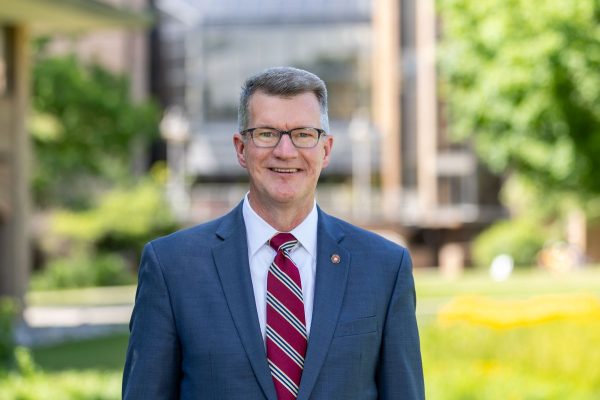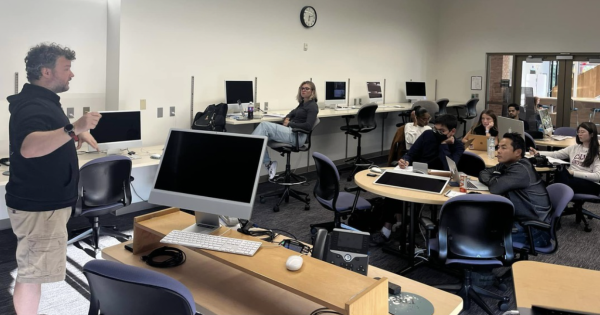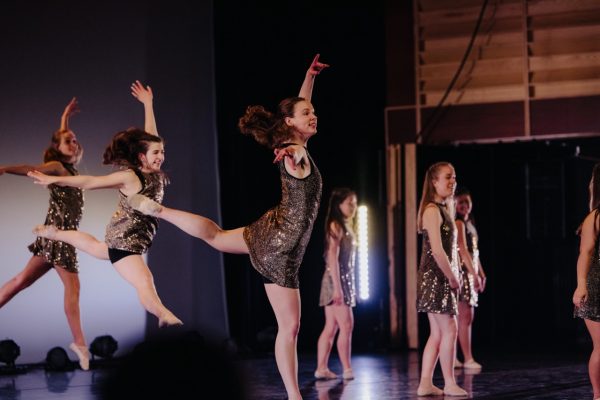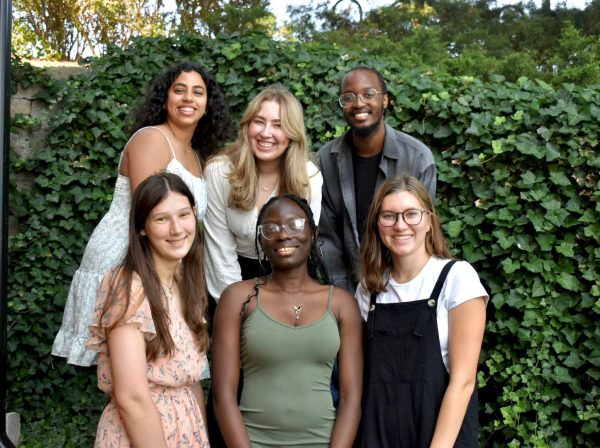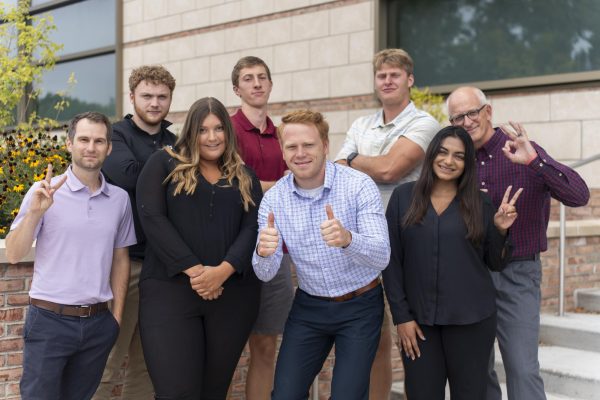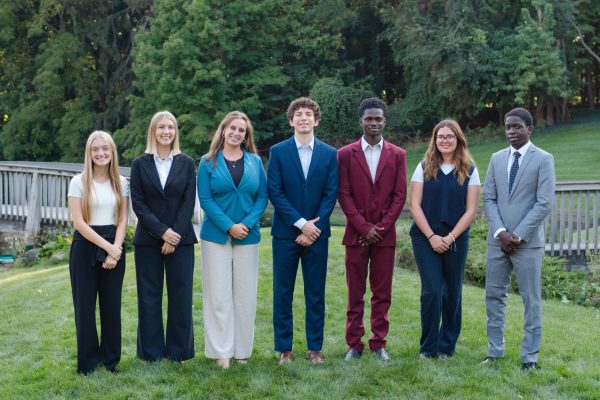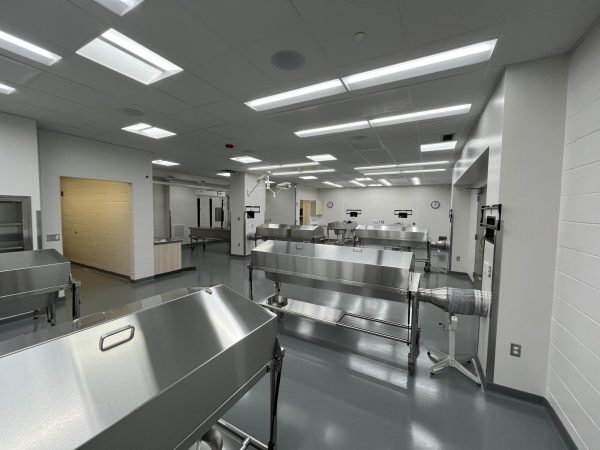Calvin Prison Initiative reconnects after season of remote learning
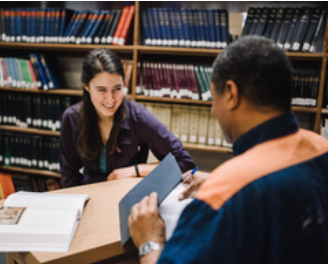
Photo courtesy Calvin Prison Initiative
Before the pandemic, students from Calvin’s main campus often tutored at the Handlon campus
The Calvin Prison Initiative began this school year with a long-awaited reunion of students, staff and faculty after 17 months of remote instruction.
Since the program began, 11 CPI students have been released on parole. With support, some have joined the main campus to finish up their degrees in person.
The months leading up to the 2021-22 school year were a rollercoaster, with CPI students working to complete their fall, spring and summer semesters between February and July after a COVID-19 outbreak at Handlon Correctional Facility in late 2020 affected more than 75 % of inmates and halted in-person learning.
The highly-anticipated resumption of face-to-face instruction required a lot of preparation and adaptation. CPI Student Success Specialist Christina Haven explained that the program had to navigate a faculty shortage since some professors were unable to resume in-person lecturing. The Handlon facility administration is also undergoing internal revisions, which further complicated the transition process.
Regardless, CPI staff and students alike, as well as Handlon personnel, were grateful for the chance to reconnect in person.
“We feel pretty privileged in that they’ve allowed us to do more than some other organizations right now,” said Todd Cioffi, director of the CPI. “It’s partly that they recognize that the Calvin program is very significant and they wanted to make sure that this keeps on track.”
CPI had to comply with the Ionia facility’s COVID rules as it resumed its daily visits. CPI visitors reported their vaccination status and are required to wear masks at all times. Students are also encouraged to get vaccinated, as Handlon provides the opportunity to do so. The safety outcome of CPI visits will help determine whether Handlon can safely accommodate more volunteers.
In spite of these limitations, CPI is growing rapidly, with an increase from 20 to 30 admitted applicants this year. Its third set of students will be graduating in the spring.
The program strove to recreate a sense of normalcy despite COVID constraints. To maintain social distancing, two-thirds of the students listen in on lectures in separate rooms through live video conferences. The students rotate every third class session to be face-to-face with a professor. Alternatively, the prison’s auditorium is used to accommodate all 110-115 students for larger classes.
Such new arrangements place a strain on the school facility’s four classrooms, but students and faculty are taking things in stride and classes continue smoothly for the most part.
“It’s not ideal, but for the professors, they’re thankful to be in person and same for the students,” Haven said.
Even so, for some of the first and second years, switching back to in-person instruction required a greater adjustment after the extended period of remote learning.
The pandemic took a serious toll on the physical and mental health of both CPI students and their fellow inmates. In addition to contracting COVID, many also lost loved ones and never got the chance for closure as visits were disallowed for safety reasons.
“They’re already isolated. They’re already confined. And then the pandemic makes it even worse,” said Chioffi.
It took perseverance and commitment from both students and faculty to continue education remotely.
“Before we started classes, me, Kary [Bosma] and Todd went in and met with all the students … just to say, ‘holy wow, we’ve been through a lot in these last 17 months and look at where we are, we’re here together,” Haven told Chimes.
Despite the obstacles they’ve faced this year, the CPI celebrates the return of community, which remains a primary goal, and hopes to reintroduce group activities as the facility gradually reopens. Student organizations, peer tutoring, and the campus’ rhetoric center will restart within the next week.
The CPI is also working with SAO to co-host future events at the Handlon campus to facilitate inter-campus relations. The program is always searching for opportunities to strengthen the relationship between the two campuses. Hosting joint classes at the facility is another way the CPI hopes to further this goal in the future.
Prior to the pandemic, extracurriculars were a highlight for many CPI students.
“That’s really when they started to feel very much like a student … like life kind of felt normal for a little bit, ” Chioffi said.
The Calvin Peacemakers, a student organization on the main campus, is excited at the chance to connect with its CPI student partners — the Handlon Restorative Justice Club.
The group was started in February by students inspired by the work of CPI and its Restorative Justice Club. The Calvin Peacemakers’ main purpose is to bridge the gap between both campuses by supporting and to advocate for restorative justice.
The prolonged COVID restrictions at Handlon prevented a meeting between the sister organizations, so the Peacemakers spent time learning more about mass incarceration and becoming involved with the larger restorative justice community in Michigan. However, with the new possibilities of video conferences and visits, the Peacemakers are ready to properly introduce themselves to Handlon Restorative Justice Club students as allies and plan the future agenda together. One main goal is to host a restorative justice conference in the spring.
“Filling them in on what we’ve been up to I’ve heard will be really exciting for them to hear… and for us to learn from them about what their experience has been like during COVID,” said Cora Vanden Heuvel, vice president of the Peacemakers.
The club hopes to invite other traditional Calvin students on visits as the Michigan Department of Corrections’ COVID restrictions lessen.
“When you’re talking to someone right in-person, you can just really feel the power right of restorative justice, and learn from them, and know that we are fellow students and that they deserve a second chance,” Vanden Heuvel said. “I think that bringing other Knollcrest East students into the prison will be really powerful.”



